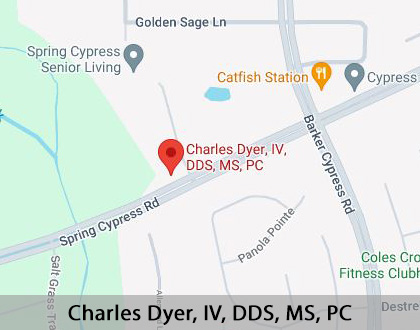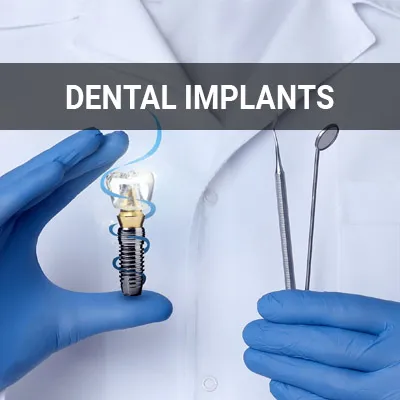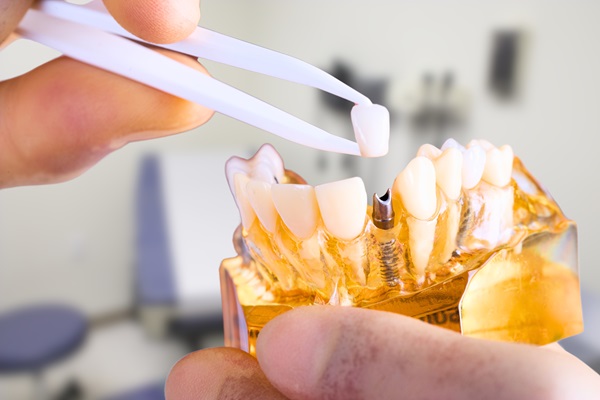Tooth Replacement Cypress, TX
Tooth replacements typically take the place of missing, decayed, or severely damaged teeth - teeth that no longer function properly or as well as they could. Tooth replacements enhance the physical appearance of your smile while also improving oral function. Compromised teeth can cause a plethora of oral and systemic health problems if left untreated. Tooth replacements, such as crowns, bridges, and dentures, now come in tooth-colored material, allowing us to color-match your surrounding natural teeth.
At Charles E. Dyer IV, DDS, MS, PC, we offer tooth replacement treatments for patients with missing or severely decayed or damaged teeth. Our team can help identify the root cause, treat it, and prevent further oral health problems from arising. To learn more about a procedure or schedule an appointment, call (281) 213-0900 today.
What is Tooth Replacement?
Tooth replacement refers to a dental restoration procedure that replaces a dysfunctional tooth with a new, functional one. Dental restorations provide a secure, durable, and effective solution for an empty gap, compromised tooth, or a dental implant. They restore oral function while preventing further decay and infection in the affected area.
Tooth replacements are custom-made to fit each individual's unique mouth and oral structure. They are color-matched to resemble the patient's remaining teeth and include natural-looking grooves and ridges. Tooth replacement can treat a single tooth, multiple teeth, or the entire mouth.
“Tooth replacement refers to a dental restoration procedure that replaces a dysfunctional tooth with a new, functional one.”
What is Complete Teeth Replacement?
Complete teeth replacement is when a dentist removes all the natural teeth from a patient's mouth and replaces them with dental prosthetics or implants. Complete teeth replacement is needed when more teeth are damaged than are still functional. This may be caused by extensive periodontal disease, injury, or decay. When one of these issues has caused many teeth to fall out or become infected, the dentist will have to perform a full mouth extraction to replace the entire set of teeth.
Typically, patients who require a full mouth extraction have two options for replacement teeth: complete dentures or dental implants. To determine which choice is right for a particular patient, the dentist will assess the patient's lifestyle, dental hygiene regimen, and bone structure. Complete dentures consist of metal and acrylic resin attached to a hard plastic base resting securely on the patient's gums. Dental implants are small titanium posts that serve as artificial tooth roots. Installing these in the mouth allows dentists to implant permanent artificial teeth.
“Complete teeth replacement is when a dentist removes all the natural teeth from a patient’s mouth and replaces them with dental prosthetics or implants.”
Types of Tooth Replacements
The type of tooth replacement a patient needs will depend on their case, current oral health, and the amount of teeth needing replacement. Crowns and bridges are typically used after a root canal procedure or when one or more teeth have been knocked out or compromised due to severe decay or damage. Dentures are designed to replace worn out, loose, or missing teeth; they may be removable or fixed. Dental implants are actually artificial tooth roots that secure a dental restoration in place.
Common types of tooth replacements include:
- Bridges
- Complete Dentures
- Crowns
- Dental Implants with a Restoration
- Partial Dentures
“The type of tooth replacement a patient needs will depend on their case, current oral health, and the amount of teeth needing replacement.”
Check out what others are saying about our dental services on Yelp: Tooth Replacement in Cypress, TX
Benefits of Tooth Replacements
Both partial and complete teeth replacement improves oral motor function in patients with problem teeth. Patients with numerous missing teeth may have trouble chewing and talking. All teeth replacement options can help with this as well as remedy oral problems such as excessive decay and periodontal disease.
Going without treatment for missing, decayed, damaged, traumatic, or fractured teeth can cause a plethora of oral and systemic health problems. Over time, the gums and underlying bone cannot withstand the wear and tear of a compromised tooth, and it will eventually fall out. Replacing compromised teeth early on can restore oral function, enhance physical appearance, and prevent further complications.
“Both partial and complete teeth replacement improve oral motor function in patients with teeth problems.”
Questions Answered on This Page
Q. What are tooth replacements?
Q. What is a complete teeth replacement?
Q. What are the types of tooth replacements?
Q. What are the benefits of tooth replacements?
Q. What is the process of tooth replacement?
People Also Ask
Q. What are the benefits of dental implants?
Q. What types of dentures are available?
Q. How do dental implants and dental crowns differ?
Q. What happens during an extraction procedure?
Q. What are the most common cause of periodontal tooth loss?
The Tooth Replacement Process
The process of tooth replacement depends largely on the type of replacement and restoration being used. Nonetheless, the first step is creating an individualized treatment plan. The treatment plan will list the treatments and outline the desired outcomes; it may be adjusted as needed. The process for the various types of tooth replacement options are:
- Complete Dentures: The dentist will then perform a full mouth extraction to remove all of the remaining natural teeth. If the patient has opted for dentures, a cast will be made of the gums, and then the small appliances will be specially made to fit securely inside the mouth.
- Crowns and Bridges: The tooth replacements take the place of a single tooth or multiple teeth. Once the natural tooth is removed, the crown or bridge is affixed to an abutment using a special cementing material and curing light.
- Dental Implants: Implants can be installed immediately after extraction, but the artificial teeth cannot be placed until the implants fuse to the jawbone. The American College of Prosthodontists states that an artificial tooth can be attached to the implant after this fusion has taken place.
- Partial Dentures: Teeth are extracted, then impressions are taken of missing teeth area. Temporary tooth replacements are placed until permanent dentures are ready.
“The process of tooth replacement depends largely on the type of replacement and restoration being used.”
Frequently Asked Questions
Q. Does complete teeth replacement hurt?
A. The extraction process is often the most uncomfortable part of complete teeth replacement. Dentists use soft wax to take molds for dentures, and new appliances may cause soreness for a few days, but the general process is not painful. A local anesthetic may be necessary when installing dental implants, so patients typically experience minimal pain, only swelling and mild soreness after the procedure.
Q. What is the recovery process for all teeth replacement options?
A. Dentures can be installed during the same appointment as the extraction. Patients may need to return for minor adjustments over the first few weeks, but the recovery process is typically quick and painless. Because the dental implant process takes several appointments to complete, patients may experience minor discomfort between visits.
Q. Who should get a complete teeth replacement?
A. Anyone whose teeth have experienced significant disease, injury, or decay may be a candidate for teeth replacement. Patients should have healthy oral tissue to qualify for the procedure. They also must be healthy enough to undergo minor dental surgery in the case of implants.
Q. Do all teeth replacement options look natural?
A. Both dentures and implants are designed to look natural. Regardless of which option a patient chooses, the dentist can match the shade to that of the original teeth, resulting in a more natural look. Because they are permanently fixed in place, implants typically look more realistic than dentures. However, both options can be shaped and colored to look natural.
Q. How should teeth replacements be cared for?
A. Proper dental hygiene is essential for caring for replacement teeth. As with natural teeth, dentures and implants need to be cleaned thoroughly on a regular basis. Replacement teeth should be cleaned with a soft-bristled toothbrush, mild soap, and water.
Q. What are the benefits of choosing dental implants for complete teeth replacement?
A. The primary benefit of choosing implants over dentures is enhanced comfort. Ill-fitting dentures can potentially come loose and rub against a patient's gums, causing sores and irritation and impeding routine functions. Because implants are permanent, patients rarely feel them. They also look more natural than dentures and can last a lifetime with proper care and maintenance.
Start Feeling Better – Visit Us Today
By visiting us as soon as possible, our team can help get you the professional treatment you need. Instead of waiting around and allowing the symptoms to get worse, we can provide you with treatment options.
Definitions
Call Us Today
Tooth replacement consultations and treatments are available at our office in Cypress. Charles E. Dyer IV, DDS, MS, PC looks forward to treating you and helping create the smile of your dreams. Call our office at 281-213-0900 to learn more or schedule an appointment.
Helpful Related Links
- American Academy of Periodontology (AAP). American Academy of Periodontology (AAP). 2023
- Center for Disease Control and Prevention (CDC), Periodontal Disease Page. Center for Disease Control and Prevention (CDC), Periodontal Disease Page. 2023
- WebMD, What Is a Periodontist?. WebMD, What Is a Periodontist?. 2023
About our business, license, and website security
- Charles E. Dyer IV, DDS, MS, PC was established in 2007.
- We accept the following payment methods: American Express, Cash, Check, Discover, MasterCard, and Visa
- We serve patients from the following counties: Harris County, Washington County, and Waller County
- We serve patients from the following cities: Cypress, Houston, Katy, Spring, The Woodlands, Brenham, Waller, Sugar Land, Jersey Village, and Hempstead
- TX (License #21174). View License Information and Specifics
- National Provider Identifier Database (1285771352). View NPI Registry Information
- Healthgrades. View Background Information and Reviews
- Norton Safe Web. View Details
- Trend Micro Site Safety Center. View Details
Back to top of Tooth Replacement










